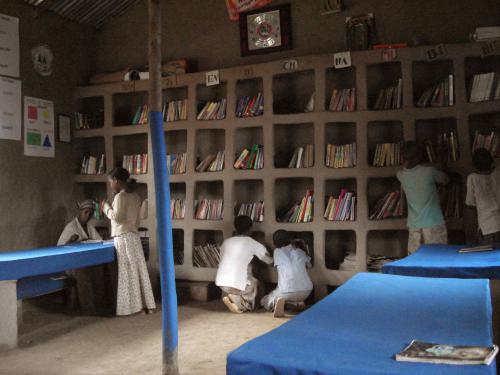
Image Credit:
"A Community Library in Ethiopia" by Robert Joumard, 2010. Reused with permission. http://commons.wikimedia.org/wiki/File:Bibliotheque_Awra_Amba.jpg
As many literary archivists know, reading societies were a prominent feature of the 19th and prewar-20th century American social scene. They provided a valuable and oft-overlooked service giving women and people of color a voice in literary and cultural affairs in the days before the academy had been more fully opened, and, the story goes, largely faded away once it had.
Or did reading societies just have a technology problem? Anyone with an Amazon account can see that book reviews there don't look much like other product reviews at all. They look much more like what goes on more politely at Goodreads, an online service specifically meant to function the way that reading societies once did: to let people whose cost of membership is no more than access to the book in question debate the form, function, and merit of every literary genre imaginable.
So what does this have to do with pedagogy? I think that online reading societies exist because, academia's romantic ideals about individual relationships with text be damned, they provide a dinner-table form of textual mediation that can bridge the gap between personal experience, classroom discussions, and professional criticism. This service is specifically applicable to introductory literature and composition courses in which students are asked to make the step from summary to response.
Asking for response from students is asking them to make a leap of faith: the faith that, in transitioning from finding out what the important bits of the text are to responding to them, they have something appropriate and interesting to say, even in principle—that their experiences and insights contribute anything of worth. Classroom discussion only puts them in a boat with everyone else in the same situation (frankly, a captive audience), and professional criticism puts them in touch with people whose engagement with the primary texts assumes all the knowledge that intro students have yet to acquire—at the added cost of often taking longer to read than the primary literature itself.
I call Amazon and Goodreads “dinner table mediation” because, like conversations at the traditional family dinner, the best reviews assume several things: there will be a range of expertise and maturity in the room, there are rules of decorum, and only certain subjects have the potential to be of mutual interest to everyone. Like the reading societies of old, membership is strictly optional and so the perspectives are of those legitimately interested in the books. For our first-year forum (the required introductory composition class at Texas) this year, we used Emily Brady's Humboldt: Life on America's Marijuana Frontier. A range of Goodreads reviews will demonstrate the range of interests at play in responding to and evaluating the book: geography, economics, law, ethics, and, really, how much people like getting high.
I like online reviews as a research and modeling tool for first-year students because they can contribute to a desirable shift in students' reading habits. Students looking at the bewildering array of means by which they might respond to texts often either conclude that there are objectively valid answers to the question or, just as problematically, assume that anything at all is fair game. Reviews allow people to narrow their options by a definitional shift that looks like the following. Q: What are interesting issues in a text? A: What other people already find interesting about the text. It's something of an intro to what Stanley Fish calls “interpretive communities,” an idea that the meaning of texts isn't hidden within them, but is constructed amongst writers and readers.
Practical downsides to this approach are, of course, that students might just decide to borrow what they see, either outright cut-and-paste plagiarizing or mimicking the structure so closely that they might as well be. Luckily, these reviews rank high on Google's search priorities, so if the students can find them, so can the instructor. All technology, alas, comes with a price.*
*A footnote: when I wrote this, I had completely forgotten that I had already blogged about this topic once. However, I think it's different enough from the first post to justify its own existence, and so let's think of it as a sequel.

